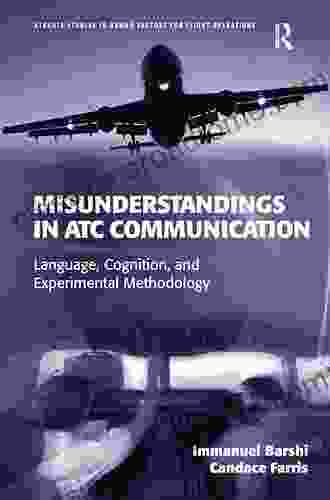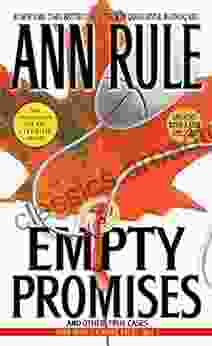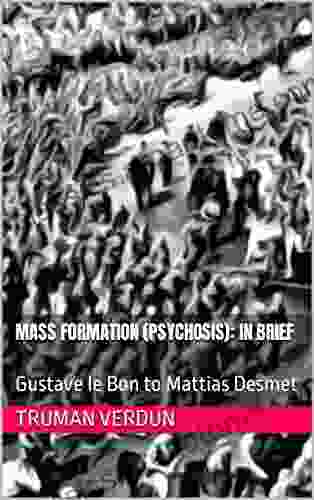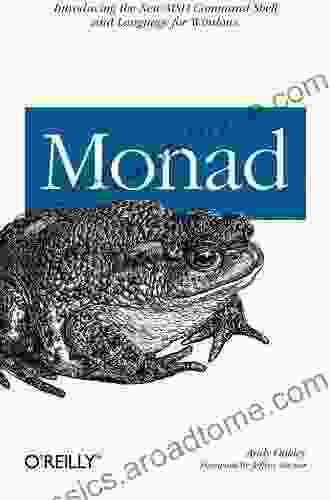Gustave Le Bon to Mattias Desmet: A Historical Exploration of Mass Formation

In the realm of social psychology, the concept of mass formation has emerged as a compelling framework for understanding the dynamics of collective behavior and the rise of mass movements.
5 out of 5
| Language | : | English |
| File size | : | 29607 KB |
| Text-to-Speech | : | Enabled |
| Screen Reader | : | Supported |
| Enhanced typesetting | : | Enabled |
| Print length | : | 146 pages |
| Lending | : | Enabled |
Pioneered by Gustave Le Bon in the late 19th century, the theory of mass formation posits that under certain conditions, individuals can be drawn into a state of heightened suggestibility and emotional contagion, surrendering their individual agency and becoming susceptible to the influence of charismatic leaders and persuasive propaganda.
In recent years, the work of Mattias Desmet, a contemporary psychiatrist and professor, has revived interest in Le Bon's ideas and extended them to the contemporary era. Desmet argues that the widespread fear, isolation, and economic insecurity created by the COVID-19 pandemic have created fertile ground for mass formation.
In this article, we will delve into the historical evolution of the concept of mass formation, exploring the contributions of Le Bon and Desmet and examining the psychological and societal factors that contribute to its emergence and potential dangers.
Gustave Le Bon: The Crowd and the Individual
Gustave Le Bon, a French psychologist and sociologist, is widely regarded as one of the founders of social psychology. In his seminal work, "The Crowd: A Study of the Popular Mind" (1895),Le Bon argued that when individuals are gathered in large groups, they undergo a psychological transformation.
According to Le Bon, the crowd possesses a distinct "group mind" characterized by heightened suggestibility, emotionalism, and a loss of individual responsibility. He believed that crowds are prone to impulsive and irrational behavior, making them susceptible to manipulation by demagogues and charismatic leaders.
Le Bon identified several factors that contribute to the formation of mass movements, including:
- Anonymity: In large crowds, individuals feel a sense of anonymity, which reduces their inhibitions and allows them to engage in behaviors they would not normally engage in as individuals.
- Emotional contagion: Crowds are characterized by a high level of emotional contagion, where the emotions of one individual spread rapidly to others, amplifying and intensifying group emotions.
- Suggestion: Crowds are highly susceptible to suggestion, particularly from charismatic leaders who can tap into the emotions and desires of the group.
Le Bon believed that mass movements pose a significant threat to democracy and individual freedom. He argued that demagogues and dictators can exploit the irrationality of crowds to gain power and suppress dissent.
Mattias Desmet: Mass Formation and the COVID-19 Pandemic
In recent years, Mattias Desmet, a Belgian psychiatrist and professor, has revived interest in Le Bon's ideas and extended them to the contemporary era.
In his book, "The Psychology of Totalitarianism" (2022),Desmet argues that the widespread fear, isolation, and economic insecurity created by the COVID-19 pandemic have created fertile ground for mass formation.
Desmet identifies four key conditions that contribute to the emergence of mass formation:
- Free-floating anxiety: A general sense of anxiety and unease that is not attached to any specific object or threat.
- Social isolation: A lack of social connection and support, which can lead to feelings of loneliness and alienation.
- A sense of meaninglessness: A feeling that life lacks purpose or direction, which can lead to a desire for something to believe in.
- A charismatic leader: A charismatic individual who can provide a sense of certainty and direction in times of uncertainty and anxiety.
Desmet argues that when these four conditions are present, individuals are more likely to become susceptible to mass formation and to embrace authoritarian ideologies that promise to restore Free Download and meaning to their lives.
The Dangers of Mass Formation
Mass formation poses significant dangers to democracy and individual freedom.
When individuals are swept up in mass movements, they become less critical and more obedient to authority. They may be willing to sacrifice their own interests and those of others in pursuit of a common goal, even if that goal is harmful or immoral.
Mass formation can lead to the rise of authoritarian regimes, the suppression of dissent, and the erosion of civil liberties.
It is important to be aware of the factors that contribute to mass formation and to be vigilant against its dangers.
The concept of mass formation is a powerful tool for understanding the dynamics of collective behavior and the rise of mass movements. The work of Gustave Le Bon and Mattias Desmet provides valuable insights into the psychological and societal factors that contribute to the emergence of mass formation and its potential dangers.
By understanding the mechanisms of mass formation, we can be better equipped to resist its allure and to protect our democracies and individual freedoms.
5 out of 5
| Language | : | English |
| File size | : | 29607 KB |
| Text-to-Speech | : | Enabled |
| Screen Reader | : | Supported |
| Enhanced typesetting | : | Enabled |
| Print length | : | 146 pages |
| Lending | : | Enabled |
Do you want to contribute by writing guest posts on this blog?
Please contact us and send us a resume of previous articles that you have written.
 Book
Book Novel
Novel Page
Page Chapter
Chapter Text
Text Story
Story Genre
Genre Reader
Reader Library
Library Paperback
Paperback E-book
E-book Magazine
Magazine Newspaper
Newspaper Paragraph
Paragraph Sentence
Sentence Bookmark
Bookmark Shelf
Shelf Glossary
Glossary Bibliography
Bibliography Foreword
Foreword Preface
Preface Synopsis
Synopsis Annotation
Annotation Footnote
Footnote Manuscript
Manuscript Scroll
Scroll Codex
Codex Tome
Tome Bestseller
Bestseller Classics
Classics Library card
Library card Narrative
Narrative Biography
Biography Autobiography
Autobiography Memoir
Memoir Reference
Reference Encyclopedia
Encyclopedia Laura Resau
Laura Resau Andy Green
Andy Green Ann Pearlman
Ann Pearlman Colin Moock
Colin Moock Mangey Ram
Mangey Ram Kathleen M Adams
Kathleen M Adams Andrew Mallett
Andrew Mallett Andrew Martin
Andrew Martin Angus Konstam
Angus Konstam Andrew Lawes
Andrew Lawes Andrew Hasdal
Andrew Hasdal Angela C Santomero
Angela C Santomero Amye Archer
Amye Archer Andrea Celik
Andrea Celik Andreas Jess
Andreas Jess Karen Dimmick
Karen Dimmick Andrea Di Robilant
Andrea Di Robilant Andrea Bieler
Andrea Bieler Michael B White
Michael B White Andrew Frank
Andrew Frank
Light bulbAdvertise smarter! Our strategic ad space ensures maximum exposure. Reserve your spot today!

 Ernest HemingwayActionable Solutions To Common Problems When Building Websites With Wordpress
Ernest HemingwayActionable Solutions To Common Problems When Building Websites With Wordpress Juan ButlerFollow ·6.9k
Juan ButlerFollow ·6.9k Hamilton BellFollow ·16.1k
Hamilton BellFollow ·16.1k Sidney CoxFollow ·14.1k
Sidney CoxFollow ·14.1k Craig CarterFollow ·19.4k
Craig CarterFollow ·19.4k Anthony BurgessFollow ·18.2k
Anthony BurgessFollow ·18.2k Darnell MitchellFollow ·18.4k
Darnell MitchellFollow ·18.4k Corey GreenFollow ·8.3k
Corey GreenFollow ·8.3k Felix CarterFollow ·16.6k
Felix CarterFollow ·16.6k

 Braden Ward
Braden WardThe True Story of Murder and Betrayal
In a small town where...

 W. Somerset Maugham
W. Somerset MaughamUnraveling the Complexities of Human Language: A...
Language is a fundamental aspect of human...

 Ibrahim Blair
Ibrahim BlairTrue Crime Tales That Will Keep You on the Edge of Your...
Prepare to be...

 Rick Nelson
Rick NelsonPatterns In Rhyme: A Journey of Discovery with Patrick...
Welcome to the...

 Edgar Hayes
Edgar HayesWithout Pity: Unmasking the Evil Within
In the realm of true...

 Cooper Bell
Cooper BellFannie Lou Hamer's Indelible Legacy: Unraveling the...
The Black Freedom Movement, a pivotal...
5 out of 5
| Language | : | English |
| File size | : | 29607 KB |
| Text-to-Speech | : | Enabled |
| Screen Reader | : | Supported |
| Enhanced typesetting | : | Enabled |
| Print length | : | 146 pages |
| Lending | : | Enabled |










